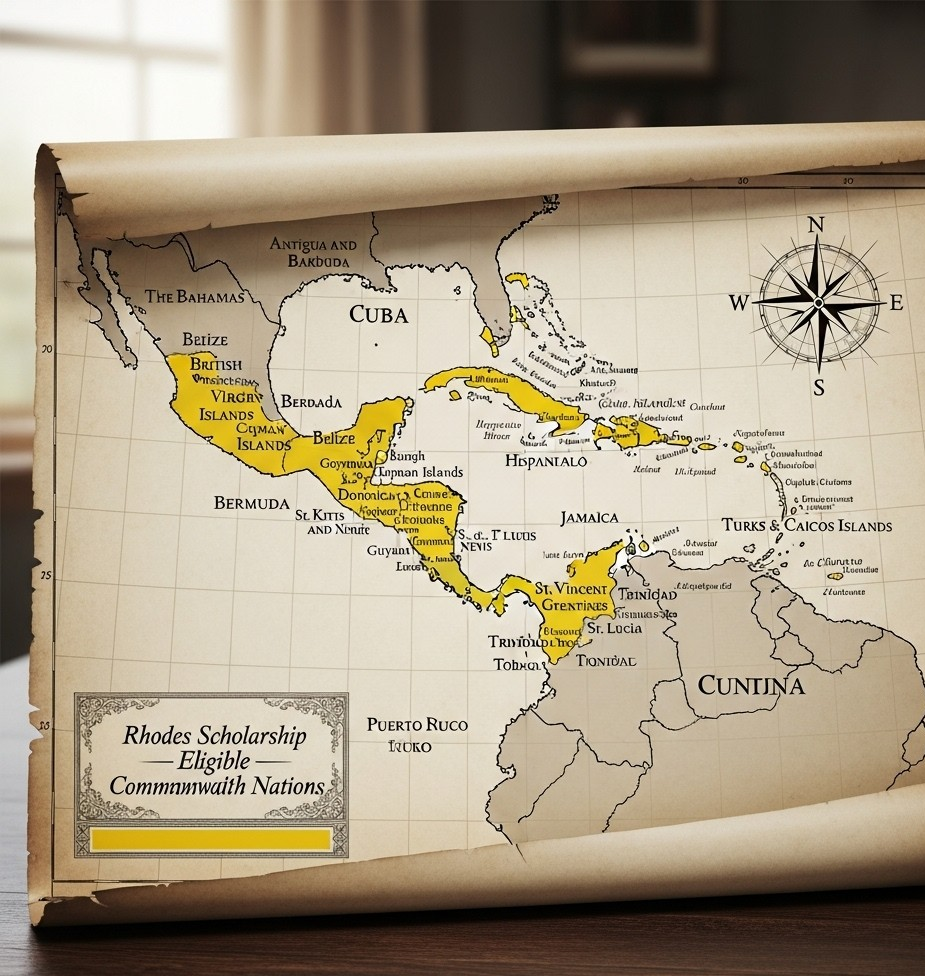The Rhodes Scholarship for the Commonwealth Caribbean is more than just a scholarship; it’s a life-changing invitation to join a global community of leaders dedicated to making a difference. If you’re a talented, ambitious student from the Caribbean with a dream to study at the University of Oxford and a passion for public service, you’re in the right place. Navigating the application can feel daunting, but this guide is designed to be your trusted companion, breaking down every step into a clear, actionable roadmap to give you the best possible chance of success.

Rhodes Scholarship for the Commonwealth Caribbean
| Key Fact | Detail |
| Award Value | Fully funds 2-3 years of postgraduate study at the University of Oxford, including tuition, fees, and a living stipend. |
| Eligible Region | Commonwealth Caribbean |
| Typical Application Period | June – September |
| Core Qualities | Academic excellence, energy to use talents, truth & courage, and moral force of character. |
Applying for the Rhodes Scholarship for the Commonwealth Caribbean is a significant undertaking, but it is an act of hope and ambition in itself. Regardless of the outcome, the process of self-reflection required will clarify your goals and strengthen your resolve. Rhodes Trust.
What Exactly is the Rhodes Scholarship?
Established in 1902 through the will of Cecil Rhodes, the Rhodes is the oldest and perhaps most prestigious international scholarship program in the world. Its goal is simple yet profound: to identify and develop young leaders from across the globe who will “fight the world’s fight.”
For students from the Caribbean, it represents a unique opportunity to pursue a fully funded postgraduate degree at the world-renowned University of Oxford. But it’s not just about the academics. It’s about becoming part of a lifelong fellowship of scholars who support, challenge, and inspire one another to address humanity’s greatest challenges.

Are You Eligible? A Deep Dive into the Requirements
Before you pour your heart into the application, the first step is to confirm your eligibility. The criteria are strict, so read this section carefully.
Nationality & Residency
You must be a citizen of one of the following Commonwealth Caribbean countries:
- Anguilla
- Antigua and Barbuda
- The Bahamas
- Barbados
- Belize
- The British Virgin Islands
- The Cayman Islands
- Dominica
- Grenada
- Guyana
- Montserrat
- St. Kitts and Nevis
- St. Lucia
- St. Vincent and the Grenadines
- Trinidad and Tobago
- Turks and Caicos Islands
You must have resided in one or more of these countries for at least five of the last ten years.
Age Limit
The age requirements are very specific. For the 2025 application cycle, you must typically be between 19 and 25 years old on October 1, 2025. This means you must have been born after September 30, 2000, and on or before October 1, 2006. Always double-check the exact birthdate range on the official application page for the current year.
Academic Achievement
You must have completed (or be on track to complete) a Bachelor’s degree with a standard of excellence that would allow you to be admitted to postgraduate study at Oxford. In most university systems, this means achieving a First Class Honours degree or an equivalent, such as a GPA of 3.7 out of 4.0 or higher.
If your degree is from a university outside the region, you must contact the National Secretary for the Commonwealth Caribbean to verify its equivalency.
Beyond the Grades: The Four Pillars of a Rhodes Scholar
Academic brilliance is the entry ticket, but it won’t win you the scholarship on its own. The selection committees are looking for individuals who embody the four criteria laid out in Cecil Rhodes’s will.
Let’s translate them into modern terms:
- Literary and Scholastic Attainments: This is your academic record. It’s the proof that you can thrive in the demanding environment of Oxford.
- Energy to Use One’s Talents to the Full: This is about your drive and zest for life. Are you a doer? Do you get involved in sports, music, art, or other activities that show your passion and determination?
- Truth, Courage, Devotion to Duty…: This speaks to your character. It’s about integrity, standing up for what’s right, and protecting the vulnerable. It’s about a deep-seated commitment to making your community—and the world—a better place.
- Moral Force of Character and Instincts to Lead: This is the big one. The scholarship seeks future leaders. You don’t need a formal title, but you must demonstrate an instinct to lead and an ability to inspire and positively influence those around you.
In my experience advising students, many successful applicants don’t have a perfect CV, but they have a powerful story that connects these four pillars. They show how their academic interests, personal passions, and commitment to service all point toward a future of impactful leadership.
How to Apply for the Rhodes Scholarship: A Step-by-Step Guide
Ready to begin? The application is a marathon, not a sprint. Start early and give each component the attention it deserves.
1. The Online Application
Your journey starts on the official Rhodes Trust website. You will need to submit:
- Proof of citizenship and age (e.g., birth certificate, passport).
- An official transcript from your university.
- A full curriculum vitae (CV) or resumé. It should be concise (max two pages) and highlight your achievements, activities, and leadership roles.
2. Your Personal Statement: Telling Your Story
This is the most crucial part of your application. It’s a 1,000-word essay where you introduce yourself to the selection committee. Do not simply list your accomplishments. Instead, craft a compelling narrative that answers three questions:
- Who are you? What are your values, passions, and motivations?
- What do you want to do? What specific problem do you want to solve or what impact do you want to make in the world?
- How will the Rhodes Scholarship and Oxford help you achieve this? Connect your past experiences to your future ambitions and explain why this specific opportunity is the essential next step.
Be authentic, be personal, and be bold. This is your chance to shine.
3. Academic Statement of Study
This 350-word statement outlines your proposed course of study at Oxford. You need to be specific. Name the program you wish to pursue and explain why. How does it fit into your long-term career goals? Why is Oxford the best place in the world for you to study this particular subject? Show the committee you’ve done your research.
4. Securing Strong Letters of Recommendation
You will need between four and five letters of recommendation. At least three must be from academics who can speak to your scholarly abilities. The remaining letters can be from “character referees”—people who know you in a professional, community, or leadership capacity.
Choose your referees wisely. Pick people who know you well and can write with specific, personal examples about your intellect, character, and leadership potential. Give them plenty of notice (at least a month) and provide them with your personal statement, CV, and information about the scholarship.
Navigating the Selection Process
After the application deadline, the National Secretary shortlists candidates for an interview. This is typically a social engagement (like a dinner) followed by a formal panel interview.
The interview is not an academic examination. It’s a conversation designed to get to know the real you. The panel will ask questions about your personal statement, your views on current events, and your vision for the future. Be prepared to think on your feet, defend your opinions respectfully, and let your personality and passion come through.

Your Guide to the Korea Aerospace University (ROK-KAU) 2025 Fellowship Programme
A Comprehensive Guide to the Rowland Fellows Program 2026 at Harvard University
FAQs
Q1:When is the application deadline?
The application deadline for the Commonwealth Caribbean constituency is typically the end of September. However, you must check the official Rhodes Trust website for the exact date for the 2025 cycle, as it can vary.
Q2:Is there a specific GPA I must have?
While there is no rigid GPA cutoff, successful candidates usually have a First Class Honours degree or its equivalent. This generally corresponds to a GPA of 3.7/4.0 or higher. The selection committee looks for evidence of “outstanding intellect.”
Q3: should I ask for a character reference?
Choose someone who has known you for a significant period and has seen your leadership and character in action. This could be a former employer, a mentor, a coach, or the head of a non-profit where you volunteered. Avoid asking family members or peer friends.
Q4:Can I apply if I am currently studying outside the Caribbean?
Yes. As long as you meet the citizenship and residency requirements, you can apply. You will need to ensure your academic transcripts and degree are verified as equivalent to the required standard.










